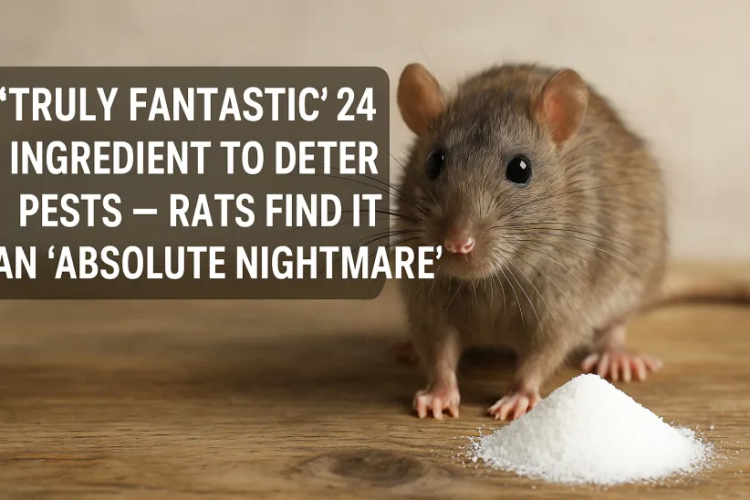‘Truly fantastic’ 24p ingredient to deter pests — rats find it an ‘absolute nightmare'
Discover how a common kitchen ingredient—garlic—can help repel rats effectively. Learn simple, affordable, and natural ways to keep rodents away using garlic, and when to seek professional pest control help.

The Surprising 24p Ingredient That Naturally Deters Rats: Garlic
Rodent problems can be frustrating for any homeowner. Rats, in particular, are persistent, destructive, and pose real health risks. While many turn to traps or chemical solutions, there's growing interest in natural methods for keeping these pests away. Surprisingly, one of the most effective and affordable options might already be in your kitchen: garlic.
According to recent findings and pest control discussions, garlic is proving to be a powerful natural deterrent against rats. With each clove costing just pennies, it’s becoming a go-to option for people looking to repel rodents in an eco-friendly, cost-effective way.
Why Rats Hate Garlic
Rats have a strong sense of smell. This sharp sense helps them detect food, avoid danger, and communicate. But this strength is also their weakness—especially when it comes to pungent smells like garlic.
Garlic contains sulfur compounds, particularly allicin, which gives off a strong odor. While that smell is useful for human cooking and health, rats find it overwhelming and irritating. In fact, pest experts say rats often avoid areas that smell heavily of garlic, making it a simple yet effective repellent.
How to Use Garlic to Deter Rats
If you’re dealing with rodent issues in or around your property, garlic could be worth trying. Here are a few methods that have worked for homeowners:
1. Crushed Garlic Cloves
Take a few fresh garlic cloves, crush them to release their oils, and place them near problem areas—under sinks, in cabinets, behind appliances, or near garbage bins. Replace them every few days as the smell fades.
2. Garlic Spray
You can make a garlic spray by blending several cloves of garlic with water. Strain the mixture and pour it into a spray bottle. Spray it along walls, baseboards, entry points, or garden edges. The smell lingers and helps keep rats away.
3. Garlic Oil or Powder
Sprinkling garlic powder or using garlic-infused oil can also help in places where spraying isn’t practical. These can be used in sheds, attics, or around garages.
When and Where It Works Best
Garlic works best as a preventive method or in mild infestations. It helps in:
-
Indoor areas like kitchens, basements, attics, or storage rooms.
-
Outdoor spaces such as gardens, garages, or under decks.
-
Small to medium rodent problems where you're trying to prevent further infestation.
Is Garlic Enough on Its Own?
While garlic can help repel rats, it’s not a one-size-fits-all solution. Here are a few important notes:
-
Not permanent: Garlic’s smell fades in a few days, so it must be reapplied regularly.
-
Won’t kill or trap rats: It’s a repellent, not a control method like traps or poison.
-
Not foolproof: If rats are hungry or desperate, they may ignore the smell.
For heavy infestations, garlic should only be a part of your overall pest control plan—not your only strategy.
Combining Garlic with Other Preventive Steps
To improve the chances of success, garlic should be used alongside good pest management practices:
-
Seal entry points: Rats squeeze through small holes. Block gaps in doors, walls, and pipes.
-
Remove food sources: Store food in airtight containers and keep garbage sealed.
-
Eliminate hiding spots: Declutter and clean up storage areas, especially outdoors.
-
Use other natural repellents: Consider combining garlic with peppermint oil or vinegar, which also deter rats.
When to Call a Professional
If garlic and other natural methods don’t stop the problem, it might be time to consult a licensed pest control provider. Professionals can assess the level of infestation and recommend targeted treatments. They can also help identify hidden nests or food sources that may be attracting rodents.
Final Thoughts
Garlic may be a humble kitchen staple, but its strong odor can make a big difference when it comes to deterring rats. Whether used fresh, in spray form, or as powder, this natural remedy offers a low-cost, low-risk way to help protect your home.
However, remember: it’s a deterrent, not a cure. For long-term rodent control, it’s important to combine natural methods with preventive maintenance—and call in experts if things get out of hand.













